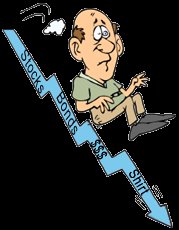 People invest in mutual fund should be aware there are 2 different prices, ie: selling price and buying price similar to currencies exchange rate. The selling price of the fund is ALWAYS HIGHER than buying price. For example, selling price is $1 while buying price is $0.935. What is this means? That means fund management sold you the fund for $1/unit and if you decide to sell it back to them (providing there is no fluctuation of the prices), you only get back $0.935. Say, if you bought the fund for $10,000, then you will only get back $9,350. Where is the remaining $650? Evaporate in the air or taken by the Martians? Nope, that is the cost paid to the pretty or handsome guys who persuade you to invest in his fund, the fancy sales booth….etc. The difference of the prices is called Sales Load.
People invest in mutual fund should be aware there are 2 different prices, ie: selling price and buying price similar to currencies exchange rate. The selling price of the fund is ALWAYS HIGHER than buying price. For example, selling price is $1 while buying price is $0.935. What is this means? That means fund management sold you the fund for $1/unit and if you decide to sell it back to them (providing there is no fluctuation of the prices), you only get back $0.935. Say, if you bought the fund for $10,000, then you will only get back $9,350. Where is the remaining $650? Evaporate in the air or taken by the Martians? Nope, that is the cost paid to the pretty or handsome guys who persuade you to invest in his fund, the fancy sales booth….etc. The difference of the prices is called Sales Load.What’s the impact of Sales Load and management fee (note: mutual fund normally incurs 1.5% of NAV as yearly management fee) to your investment in the long run? It’s huge! Let me show you the example. There are 2 investors, namely, John and Tom. John invested his money amounting $10,000 in SDF mutual fund while Tom invested his money, same amount as John directly to equity market. Assuming both investments bring them same return rate, ie: 12% per annum. What’s the end result after 10, 20 or even 40 years?

Year 0 Year 10 Year 20 Year 30 Year 40
John: $10,000 $24,966 $66,665 $178,008 $475,315
Tom: $10,000 $31,059 $96,463 $299,599 $930,510
As from the table shown, the difference of investment result for John and Tom in term of percentage after 10, 20, 30 and 40 years are 24.41%, 44.70%, 68.31% and 95.77%. This means, although the return rate for both are same, ie:12% per annum but after deducting hidden cost by mutual fund, it brings a disastrous result to its investors. As you notice, the difference could be as huge as double after 40 years!

Please bear in mind that the calculation is based on consistent 12% per annum return rate. The difference could be further if in particular years, there are negative return rate. Remember that, mutual fund management fee is Asset Based Commission (ABC), which means no matter how’s the performance of the fund, 1.5% of the ENTIRE NET ASSET VALUE will still deducted from the fund. What do you think about your fund manager performance? Do you believe they are so superior that they could register consistent high, positive return rate for you in the long run, ie: 40 years? Or is it makes sense that they somehow might make some mistakes and bring negative return to the fund? How about switching from SDF fund to ASD fund, you might ask. It is truth that this is what people normally act if one fund does not perform, they will switch to another fund. My answer? Unless you are sure the fund you switch to is by high probability they are superior than others, otherwise, don’t do it. The reason? SALES LOAD.
Technorati Tags: Investment, Mutual Fund, Unit Trust, Asset Based Commission, Sales Load, Net Asset Value, NAV, Equity,
No comments:
Post a Comment